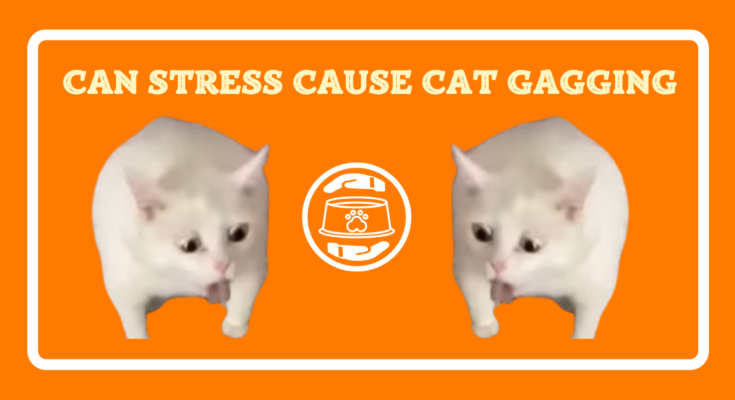Has your fur-tastic friend been emitting strange “honking” noises lately, followed by unproductive attempts to cough up something invisible? If so, you might be wondering: can stress cause cat gagging? The answer, unfortunately, is yes. While hairballs are the feline equivalent of a messy cough-up, stress can be a issue in surprising ways, including through gagging.
Uh Oh, My Cat’s Gagging! Can Stress Cause Cat Gagging ?
Your furry friend might be making strange noises and trying to cough up nothing, leaving you wondering: is your cat okay? While hairballs are a common culprit, stress can also make cats gag. But how can you tell the difference? Watch out for these clues:
1. Changes in Appetite and Food Habits:
- Reduced Eating: Feeling anxious or threatened can lead to a loss of appetite in some cats.
- Increased Eating: Others might resort to comfort eating due to stress, potentially even stealing food from the newcomer.
- Changes in Litter Box Habits: Stress can manifest in litter box avoidance, spraying outside the box, or urinating in unusual places.
2. Behavioral Shifts:
- Excessive Grooming: Excessive licking is a common way cats cope with stress and anxiety. Look for bald patches or irritated skin.
- Hiding and Withdrawal: Feeling overwhelmed, your cat might seek out secluded hiding spots and avoid interaction with both family members and the new pet.
- Vocalization: Increased meowing, yowling, or hissing can indicate discomfort or fear.
- Aggression: In some cases, stressed cats might exhibit unusual aggression towards other pets or even people.
3. Is it Hairball or Heartbreak? Differentiating the Gag
Distinguishing between stress-induced gagging and hairballs can be tricky. However, here are some clues:
- Frequency: Does the gagging happen occasionally or regularly? Stress-related gagging might be more consistent.
- Hair evidence: Are there visible hairballs or coughing attempts with no furball emerging?
- Context: Consider recent changes or stressors in your cat’s environment.
Remember: Each cat expresses stress differently. While these are common signs, pay close attention to your cat’s individual behavior and consult your veterinarian if you notice any sudden or concerning changes.
Calming the Chaos: Helping Your Cat De-Stress and De-Gag
If you suspect stress is the culprit, creating a calm and enriching environment is crucial. Here are some tips:
- Provide hiding spots: Offer quiet, cozy areas where your cat can feel safe and secure.
- Establish routines: Cats thrive on predictability. Set consistent feeding and playtime schedules.
- Feliway magic: Consider using a Feliway diffuser, which releases calming pheromones.
- Interactive playtime: Engage your cat with stimulating toys and activities to manage energy and reduce boredom.
- Veterinary intervention: For severe or persistent stress, consult your veterinarian for personalized guidance and potential medication options.
Remember: You’re your cat’s best advocate. By understanding the link between stress and gagging, you can create a calmer, happier environment for your feline friend, preventing those uncomfortable gurgles and promoting purrfect peace of mind.
Addressing the Root Cause:
If you suspect a new pet introduction is causing stress, don’t despair! Creating a positive and gradual introduction process can significantly reduce anxiety and help your cats become friends:
- Provide separate spaces: Offer safe havens for each cat with familiar items like beds, toys, and litter boxes.
- Supervised interactions: Start with brief, positive introductions under your supervision. Use treats and positive reinforcement to create positive associations.
- Go at their pace: Respect each cat’s comfort level and avoid forcing interactions.
For more detailed guidance on introducing new cats and managing feline stress, explore our article: 5 Warnings Your Cat Needs a Slower Introduction Strategy
FAQs: Decoding Your Cat’s Gagging Mystery
Q: What are other potential causes of cat gagging besides stress?
A: Hairballs, foreign object ingestion, allergies, asthma, and certain illnesses can also cause gagging.
Q: When should I be concerned about my cat’s gagging?
A: Seek immediate veterinary attention if your cat is gagging excessively, vomiting blood, lethargic, or has difficulty breathing.
Q: Are there any natural remedies to help my stressed cat?
A: Consult your veterinarian before using any remedies. Calming catnip, interactive play, and pheromone diffusers can be options.
Q: When should I be worried about my cat’s gagging?
A: Watch for these red flags:
- Excessive gagging: If it happens frequently, especially with no hairball coming up.
- Other concerning symptoms: Blood in vomit, lethargy, trouble breathing, loss of appetite, or excessive drooling.
- Gagging after eating or drinking: This could indicate a foreign object stuck somewhere.
If you notice any of these signs, consult your veterinarian immediately.
Q: How can I tell if my cat’s gagging is from stress or a hairball?
A: Look for additional clues:
- Stress: Often accompanied by other signs like hiding, changes in appetite, or litter box issues.
- Hairball: Usually followed by coughing up a hairball, may have visible hair around the mouth.
If you’re unsure, it’s always best to err on the side of caution and consult your vet.
Q: My cat keeps gagging, but there’s no hairball! What could be wrong?
A: While hairballs are a common cause of feline gagging, there are other possibilities, including:
- Stress: Cats can gag due to anxiety from new pets, loud noises, or other changes in their environment. See our article on cat stress for more info!
- Foreign object ingestion: If your cat swallowed something they shouldn’t, gagging could be a sign. Watch for other symptoms like lethargy, vomiting, or loss of appetite. Seek immediate veterinary attention!
- Allergies: Food or environmental allergies can sometimes cause gagging in cats.
- Asthma or respiratory issues: These can also trigger gagging or coughing.
- Digestive issues: Certain illnesses like inflammatory bowel disease can cause gagging.
Remember: This article offers general information, and always seek professional advice from your veterinarian for your cat’s specific needs.



